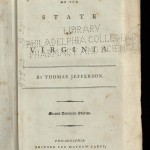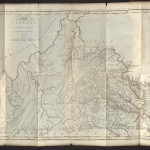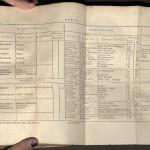Tags
Comte de Buffon, deportation, education, emancipation, Enlightenment, geography, Georges-Louis Leclerc, Indian tribes, liberty, map, Mathew Carey, nature, New World, patriotism, Philadelphia, Samuel Lewis, slavery, slaves, Thomas Jefferson, United States of America, Virginia
Notes on the State of Virginia
Thomas Jefferson (1743-1826)
Philadelphia: Printed for Mathew Carey, 1794
Second American edition
The second American edition of Notes included a large folding map of Virginia made by Samuel Lewis not in the first edition and a folding chart listing Indian tribes. Written in the form of answers to questions about Virginia, Notes contains information about the geography and social and political life of Virginia. Jefferson also used it as a forum for patriotism, expressing great optimism in regard to the future of the fledgling United States of America.
He supported this argument with a dissertation about the nature of the good society as reflected in his home state of Virginia. He discussed constitutional principles such as the separation of church and state, the importance of the system of checks and balances in a constitutional government and the need and right for individual liberty.
Jefferson passionately refuted a theory posited by the contemporary French naturalist Georges-Louis Leclerc, Comte de Buffon (1707-1788), who stated that nature – plant life, animal life and human life – degenerated in the New World.
In two different chapters, Jefferson discussed slavery, with tortuous attempts to explain and justify American slavery. Jefferson, in fact, held sway with contemporary Enlightenment belief that blacks were inferior to whites (whites were more beautiful and more intelligent). He argued for the mass deportation of slaves toward the common good of whites and blacks, slavery being demoralizing to both races. He suggested education and emancipation for slaves, and then colonization of emancipated slave children outside of the United States. Very outside, in fact. He did not suggest that they colonize any part of the North American continent.




You must be logged in to post a comment.